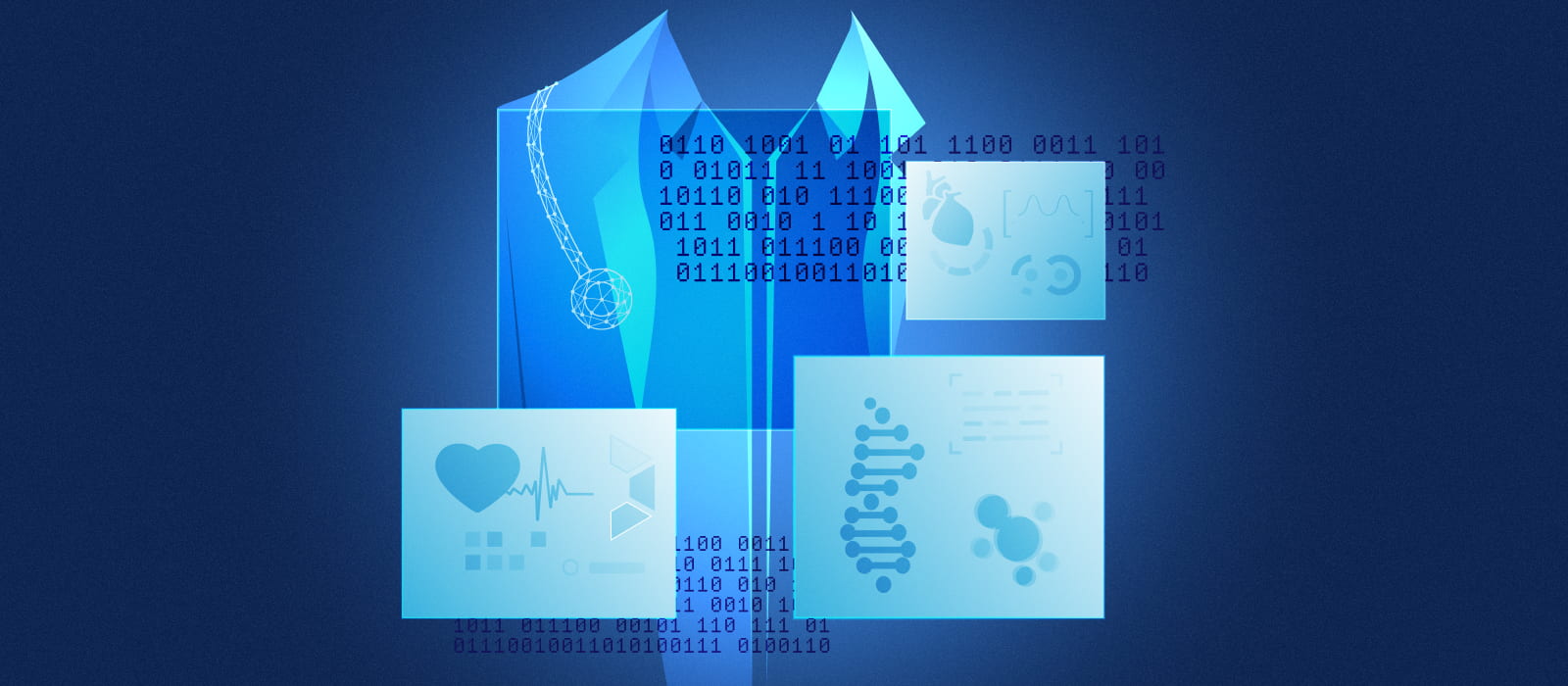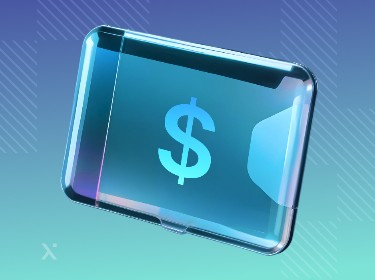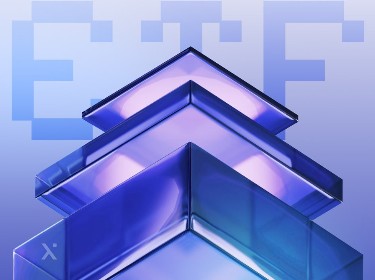In the complex world of healthcare, blockchain technology offers significant change. This technology is shaping a future where medical records, drug supply chains, and patient consent forms are as clear and unchangeable as a surgeon's dedication.
As of 2022, the value of blockchain initiatives in healthcare stood at $0.76 billion. Experts predict that by 2032, they will be worth a remarkable $14.25 billion. This rapid growth highlights that blockchain is not just a passing trend; it could play a crucial role in transforming how global healthcare systems operate.
But what problems can blockchain solve in healthcare? This vital sector is flooded with systemic issues such as data security breaches, inefficient record-keeping, unclear drug supply chains, and excessive bureaucracy that slows down patient care. Blockchain, in its turn, provides a decentralized, immutable, and transparent ledger system — qualities that could directly address these problems.
Let’s take a closer look at blockchain use cases in healthcare and the valuable changes and contributions this innovative technology can make.
Check out how we utilize numerous technologies, including but not limited to blockchain, AI, and big data, to create custom healthcare solutions
6 most promising blockchain use cases in healthcare
![]()
Six of the most promising blockchain healthcare use cases encompass patient record management, drug supply chain tracking, medical personnel credential verification, genomic research, safeguarding clinical trial data, and advancing telemedicine.
1. Patient record management
Current healthcare systems share one major challenge: data silos. Medical information is scattered across various locations, making it difficult to obtain a comprehensive view of a patient’s full history and ultimately hindering accurate diagnoses. By introducing a blockchain-based system, the security and completeness of these records are significantly enhanced.
Importantly, the blockchain doesn’t store the actual details of medical interactions but instead holds unique hash functions. These can only be accessed and deciphered with the patient’s permission, ensuring confidentiality and integrity while also providing a complete, unbroken medical narrative.
Real-life examples
BurstIQ
BurstIQ was established to address one of the most critical issues in healthcare management: the secure and integral exchange and utilization of large-scale health data.
The company leverages blockchain technology’s robust security capabilities for health applications, providing an end-to-end environment for secure data sharing. Through a multifunctional dashboard, users can consolidate and manage essential health data, create personal health records, and navigate their wellness journeys.
Furthermore, with smart contract development services, users have the power to regulate the specifics of data sharing, with the ability to adjust or revoke permissions at their discretion.
Patientory
Patientory is a decentralized app that allows patients to store and manage their health information in real time. The platform enables the generation of an individual patient profile and uses blockchain for secure, decentralized communication and information exchange. Through the app, users keep track of their health metrics, set reminders for medications or appointments, and connect with care providers.
Another noteworthy feature is a well-thought-out rewards system, which serves as an incentive for individuals to adopt healthier behaviors. Patientory also places a strong emphasis on personalized healthcare, providing tailored care plans while ensuring the secure storage of medical records within a digital repository.
Here we share our expertise on how to build your own health monitoring app
2. Drug supply chain management
Blockchain provides an immutable and transparent ledger that can track the entire journey of pharmaceutical products from manufacturing to distribution and ultimately to the patient. Each step of the supply chain, including production, packaging, labeling, and transportation, can be recorded on the blockchain, creating a secure and unchangeable history of the drug’s movement. This technology is ripe for disruption, and forward-thinking companies are exploring ICO development services for the healthcare industry to create tokens that represent ownership of these pharmaceutical products, potentially streamlining transactions and incentivizing participation in the supply chain.
This transparency helps prevent counterfeit drugs from entering the supply chain, as any discrepancy or unauthorized alteration would be immediately detectable. In case of contamination or a recall event, blockchain can swiftly identify the affected batch or product, reducing the risk to patients and saving time and resources that would otherwise be spent on manual recall processes.
Furthermore, blockchain’s smart contract capabilities can automate various aspects of drug supply chain management, such as verifying the authenticity of suppliers, automatically triggering payments upon delivery confirmation, and ensuring compliance with regulatory requirements.
Real-life examples
MediLedger
MediLedger, a project administered by Chronicled, utilizes blockchain technology to establish a decentralized network specifically for the life sciences and healthcare industry. The platform aims to ensure the privacy, security, and authenticity of transactions, facilitating the verification of drug legitimacy and the tracking of inventory. It is designed to help companies comply with drug supply chain regulations, reduce the risk of counterfeit medicine, and improve supply chain efficiency.
In June 2023, The National Association of Boards of Pharmacy (NABP) acquired the MediLedger Product Verification System (PVS) to facilitate product verification as mandated by the Drug Supply Chain Security Act (DSCSA) for trading partners and regulators.
IBM Blockchain Transparent Supply
IBM Blockchain Transparent Supply empowers organizations to establish their own blockchain-based collaboration and data-sharing network in partnership with their supply chain collaborators. This platform provides customized solutions for various industries, including the pharmaceutical sector, with the goal of improving transparency, traceability, and accountability throughout the entire production-to-delivery process.
The system assists in verifying the authenticity of pharmaceutical products, ensuring adherence to manufacturing standards, and enabling real-time monitoring of the supply chain.
3. Medical personnel credential verification
![]()
Verifying the qualifications of healthcare professionals can be a time-consuming and error-prone task, often involving manual checks and document exchanges among various institutions. Blockchain offers a secure and decentralized solution by creating a tamper-proof, transparent, and accessible ledger of medical personnel credentials.
When medical professionals earn degrees, certifications, or licenses, this information can be recorded on the blockchain. These records are cryptographically secured, ensuring their authenticity and preventing unauthorized alterations.
Both healthcare institutions and regulatory bodies can access this blockchain ledger to instantly and reliably verify the credentials of medical personnel. This streamlined verification process not only saves time but also enhances patient safety by ensuring that only qualified and licensed individuals are providing healthcare services.
Real-life examples
ProCredEx
ProCredEx leverages blockchain technology to enable fast and secure sharing and verification of healthcare credentials. The goal is to reduce the time-consuming processes involved in validating credentials by providing a trusted source of credential verification data, making staffing more efficient and ensuring that all healthcare professionals are properly verified.
Hedera Hashgraph
Although this technology was not specifically built for healthcare, Hedera Hashgraph offers solutions for secure and verifiable records, which can be used for credentialing healthcare professionals. By using a public ledger, Hedera enables real-time auditing of any record system, such as professional credentials, ensuring data integrity and immediate verification.
Meet Blockcerts, a blockchain-powered digital document verification system developed by PixelPlex
4. Genomic research
Among other promising blockchain in healthcare use cases is genomic research. This technology is revolutionizing the way genetic data is handled, shared, and analyzed, offering profound possibilities for personalized medicine, drug development, and our broader understanding of human biology.
One of the most significant challenges in genomic research is managing vast amounts of sensitive data while ensuring privacy, data integrity, and accessibility for legitimate research. Simultaneously, it’s crucial to maintain individuals’ control over their data.
Blockchain can securely encrypt genomic data and keep it immutable and tamper-proof. Its decentralized nature guarantees that no single entity has control over the information. This means researchers can rely on the authenticity of genomic data, and participants can confidently share their genetic information, knowing they retain ownership and that their privacy is safeguarded.
Real-life examples
Nebula Genomics
Nebula Genomics integrates blockchain technology to ensure a privacy-focused approach to genetic testing, enabling individuals to maintain ownership and strict control over their personal genomic data. This system eliminates reliance on third-party data handlers, significantly reducing the risks of unauthorized access or breaches in data privacy, whether by hackers, governmental entities, or the testing providers themselves.
Additionally, Nebula utilizes advancements like homomorphic encryption and secure multi-party computations, allowing users to contribute their anonymized genomic data to scientific research without compromising their identity or privacy.
EncrypGen
EncrypGen operates on its proprietary blockchain called Gene-Chain. It empowers individuals to take control of their genetic data, allowing them to upload their raw DNA data files and create Gene-Chain profiles. This decentralized platform aims to increase the availability of genetic data for research while enhancing privacy and security for users. Individuals can also profit from their contributions to science using DNA tokens.
Gene-Chain’s unique feature is its ability to protect user identities while providing valuable data to researchers. By stripping away names and emails from DNA data files, buyers can search for suitable Gene-Chain profiles for their projects and purchase de-identified genomic data using DNA tokens.
Generative AI is yet another powerful technology that can enable meaningful digital transformation in healthcare. Find out more
5. Clinical trial data security
Blockchain technology has the potential to greatly enhance the security and integrity of clinical trial data. Once data is entered on the blockchain, it cannot be altered or deleted without consensus from the network, reducing the risk of data manipulation or fraud. This transparency and immutability provide a high level of trust in the authenticity of clinical trial data, which is crucial for regulatory compliance and maintaining the integrity of the research.
Secondly, patient confidentiality is paramount in clinical trials, and blockchain’s cryptographic techniques can enable secure data sharing. With blockchain, patients can have greater control over who accesses their data and for what purposes, allowing them to grant or revoke access permissions as needed.
Real-life examples
ClinTex
ClinTex offers an innovative solution for the pharmaceutical and academic medical research industry through its CTi (Clinical Trials Intelligence) ecosystem. This platform harnesses the power of blockchain technology to drive efficiency in clinical trials by providing advanced data analytics services.
The utilization of blockchain also ensures a secure and unchangeable audit trail, facilitating collaboration across the pharmaceutical industry. This approach not only enhances data integrity but also meets FDA regulatory requirements.
Triall
Triall is a comprehensive solution designed to revolutionize clinical development by integrating blockchain technology and data-driven tools. This innovative platform empowers clinical research professionals throughout the entire clinical trial journey, starting from study design and continuing through execution to post-study activities.
Triall’s approach brings Web3 principles to medical research, creating a digital ecosystem that seamlessly incorporates blockchain-integrated software solutions. By doing so, it enhances the security and integrity of clinical trials, making them resistant to tampering.
Moreover, Triall facilitates secure and efficient collaborations among the various stakeholders and systems involved in clinical trial processes.
6. Telemedicine developments
![]()
The usage of blockchain technology in telemedicine is among significant blockchain use cases in healthcare.
Firstly, blockchain can enhance data security and privacy, addressing key concerns in telemedicine. Patient health records, which often include sensitive medical information, can be securely stored on a blockchain network. These records are encrypted and accessible only to authorized individuals, ensuring that patients’ data remains confidential. This level of security and data integrity builds trust between patients and healthcare providers, encouraging greater adoption of telemedicine technology.
Secondly, as telemedicine involves remote consultations, prescriptions, and payments, the need for trust and security in financial transactions is also important. Through smart contracts, blockchain can automate and securely enforce payment agreements between patients, healthcare providers, and insurers. This eliminates the need for intermediaries and reduces the risk of fraudulent claims or billing errors.
Real-life examples
MediBloc
MediBloc is a blockchain-based healthcare data platform that aims to give patients control over their medical records and facilitate secure sharing with healthcare providers. While their primary focus is on health data management, their platform can be integrated into telemedicine services to enhance data security and accessibility.
MedX
MedX is a decentralized telemedicine platform built on the Ethereum blockchain. It connects patients with medical professionals for remote consultations and uses smart contracts for handling payments and ensuring the security and privacy of patient information.
At the heart of MedX is OpenCare, the first decentralized application (dApp) on the platform. OpenCare acts as an international “bulletin board” for telemedicine, effectively bridging global cost disparities in healthcare by connecting patients with a diverse pool of physicians from around the world.
Learn more about how to create a patient scheduling platform based on the example of our solution
Final thoughts
Blockchain use cases in healthcare represent a transformative force with the potential to revolutionize the industry in numerous ways. At PixelPlex, we understand the immense potential of blockchain technology in healthcare and various other sectors.
As a leading blockchain development company, we specialize in creating custom blockchain solutions tailored to your specific needs. Whether you’re looking to implement blockchain use cases in healthcare, finance, supply chain, or any other domain, our experienced team is ready to collaborate with you to turn your vision into reality.
Contact us today to explore how blockchain can transform your business and enhance its capabilities.




